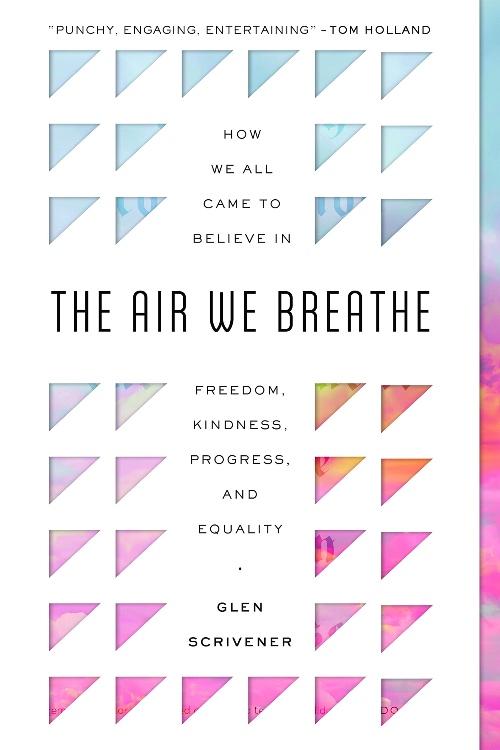The Air We Breathe by Glen Scrivener
A crisp summary of how far our society is from its imagined roots, and how Christianity has so shaped our thought
 The Air We Breathe: How We All Came to Believe in Freedom, Kindness, Progress, and Equality
The Air We Breathe: How We All Came to Believe in Freedom, Kindness, Progress, and Equality
By Glen Scrivener
The Good Book Company
ISBN: 978-1784987497
Reviewed by Terry Young
If you have read any Tom Holland (Dominion, Millennium, In the Shadow of the Sword), you will be aware of the paradox he gently teases apart, which is that the great empires of the past to which we attribute our moral outlook believed almost the opposite to what we believe today on key issues.
Glen picks up the theme and provides a crisp, compact summary of how far our society is from its imagined roots and how Christianity has so shaped our thought, that we are as unaware of it as we are of the air we breathe.
He identifies three audiences to whom he writes: those who tick the ‘none’ box on surveys with a religion question; those who use to be Christians and have rejected the faith; and Christians who are trying to make sense of the world they see around.
There are short chapters on each of the core values our secular culture has inherited – equality, compassion, consent, enlightenment, science, freedom and progress – with an introduction by way of sacred art, dominated as it is by the crucifixion. I like the way Glen helps us to sense the air we breath by showing how putrid it would have smelled back when we think it all started. So, he starts with some graffiti from ancient Roman of a donkey’s head on a human form stretched out on a cross. A devotee stands nearby and the inscription states, ‘Alexamenos worships his god.’
It doesn’t really matter where we go from there, the values we hold look absurd, often abhorrent, if we try to pin them to the empires where we think they began. For instance, it wasn’t that #MeToo couldn’t have caught on, it’s that men needed no consent unless they were planning to have sex with a social equal or above. Inferiors were fair game, while slaves and prostitutes were beyond rights, anyway.
My favourite piece is around creation narratives. When he sets the Genesis narrative against the Babylonian story, for instance, Glen shows how one accords humanity a place of significance, the other locates its role in slavery. As well as compelling points of comparison, he feeds his analysis with historical data points, while poking curiously at our own myth around Western thought.
That myth says that all was going well until, improbably, Christians got control of an empire after which disaster struck. Rome fell and for the next 1,000 years until the dawn of the enlightenment, darkness covered the earth with the Middle, or Dark, Ages. While this is a comforting line for many, it runs the serious risk of terminological inexactitude.
Glen argues that the Dark Ages, as they introduced schools, universities, and hospitals, were not nearly as backward as the atheistic soundtrack might like them to have been.
Secondly, during that time, Christian thinkers slowly won two important battles. First, they settled the might versus right argument for good: persuasion and education were better than threats and military campaigns. Second, they laid the intellectual foundations upon which the values of the old empires eventually foundered. None of the bad stuff went away overnight, but it wouldn’t have gone away at all without the so-called Dark Ages.
While Glen is lucid and brief, he’s not naïve or even jingoistic. He examines the hard questions – the Crusades, Slavery, and sex abuses. What he tries, and successfully in my view, is to show that even when Christians have been caught out and condemned, the basis on which they were judged was uniquely Christian.
On its own this book won’t turn you into an expert but it’s a really neat guide to the terrain. You won’t have to stand quietly by as someone slams the Church for wrecking the world during the Middle Ages or agree that our democratic ideals were imported in pristine condition from the ancient Greeks. And he provides places to go should you want to explore more.
It may be popular, as happened occasionally in ancient Rome, to blame Christians for all that is going wrong. What Glen tells us is that the reasoning is no sounder now than it would have been when emperors were feeding us to the lions.
If you want a voice, this is a book you need to read.
Terry Young was a member of Baptist churches when he and his family lived in Datchet from 2002 to 2021, before the nest emptied and he and his wife downsized.
He writes for Christian and Healthcare magazines, and set up Datchet Consulting to pursue interesting thinking in secular and sacred arenas
Baptist Times, 19/08/2022